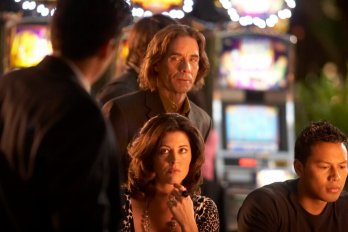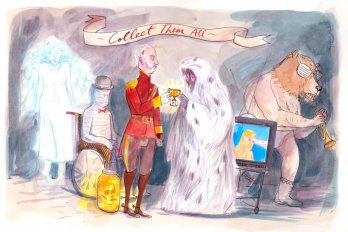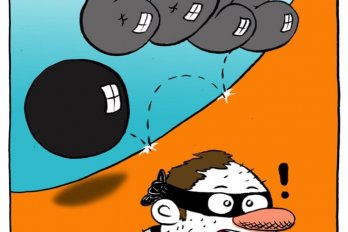Each day I wait for the melt, and each day it snows again. The snow falls in veils from the cabin roof, plumps the stone wall outside my window into a giant white loaf.
Every afternoon, when I walk the mile from my studio to the main house for dinner, the snow in the woods bordering the road is deeper, the calligraphy of the deer moving through the trees more finely etched.
Sometimes in the afternoons, instead of working, we take the small plastic sleds from the basement of the main house and struggle through the thigh-deep snow of the woods to the hill that overlooks the town. We plunge wordlessly down, labour slowly back up. The trees on the hillside are straight and thin, look like strings, and when the sun is out it plays them as a chord of light.
I don’t like tobogganing. The journey down is too fast, the return slog too slow. I don’t like the spray and sting, or the grinding of my boots against the snow. I worry about rocks and my back, about crashing into the distant fence bordering the ball diamond. But the headlong rush down the hill matches my despair at not writing, seems mildly self-destructive, and this is why I keep doing it.
After half a dozen runs, we struggle back through the snow to the road, our wet clothes freezing on our skin, stiffening the hinges of our bodies shut. At this point, it seems madness to have come, and we scuttle off to our respective studios, guilty for the work we’ve avoided, the work we’ve missed by hurling ourselves repeatedly downhill all afternoon.
In the centre of the woods, halfway between the top of the hill and the road, stands a small clutch of graves. Soldiers from the Civil War, inexplicably killed and buried here, miles from the proper cemetery. The small white graves are clustered together under the shadow of a dark, mossy boulder. A glacial erratic, left at the top of the hill by a moving wall of ice, thousands of years before these young men were born, or fought, or died.
I have read the worn inscriptions on the stones, know that the soldiers died from war, and yet, each time I push past the graves through the deepening snow, a plastic sled banging painfully against my numbing, wet legs, it seems as though the men must have died, not from war, but from tobogganing.
I am here to finish a novel, and yet each word I have already written seems entirely fraudulent, and each word I can think of to write seems entirely wrong.
All around me, in all the other cabins spread out over the two hundred acres of the arts colony, the other artists are happily industrious. At dinner, people are abuzz with their own genius and productivity. There are endless stories of endless brilliant ideas, and I am sick of all of them.
I don’t work on what I’m here to do, but I am seized by a sort of rogue creativity, the spirit of the place, perhaps, where artists have been coming to paint and sculpt and compose for 150 years. I don’t write, but I start to play the piano in my studio, even though I haven’t played piano since I was six years old. I make up short, mournful songs and call my friends on my cellphone when I know they won’t be home, so I can record the songs on their answering machines. I don’t think about my characters, but every day I sketch the stone wall outside my studio, noting the slightest changes from the weight and shape of the new-fallen snow.
I become obsessed with the old stone walls that are scattered like broken, human music across the estate, and spend hours following their weave through the snowy woods. They were made from clearing the fields, used to demarcate boundaries. They were built using large rocks, often glacial till, for the base. The size of the stones gets progressively smaller as the wall gets higher. All the walls are thigh height because this is as high as a man can lift a stone without strain, without having to raise his hands above his heart.
I think of the walls as language. They are like fine tracery with the light behind them, like lace, and they are no different from these words — each one lifted slowly into place and balanced on this page.
I sketch the walls. I play the piano. For a week, for no reason that I can fathom, I draw nothing but black swans. Hunched over the paper on the floor of the studio, the charcoal — once wood, once fire — softening to dust on the page beneath me. Light, a steady breath against the window.
What I wanted was for an idea to seize me, to arrive as expected. I wanted the simple pleasure of loving my work again. But the words for my novel can’t or don’t want to come. I’m not sure how to make my book happen, don’t know how to get my desire to finish it back. But I do come to know the black swan. I know the long snake flex of its neck, know that the shape of the body is a leaf, a wing, an open hand, the human heart. Every afternoon, I fasten these images to paper, call them swan. And every evening, I rise, black dust dripping from my hands, my arms spread empty to the empty sky, as I walk through woods feathered with shadow — darkness lifting me home.
It is all so strange, the piano playing, the drawing, and I feel almost ill with the confusion of it. The impulse to do these things feels so strong, and yet I have no idea what it means to do them, what they mean.
My life has been spent doing one thing only. I have only ever been a writer. And now, swiftly and without warning, the one thing I have depended upon has left me. Who knew literature could be so fickle? It really seems completely unreasonable, and yet, here I am, drawing the black swan and sketching the stone wall and running chord sequences on the piano.
In a ridiculous attempt to understand why I am drawing swans, I start to visit the town library and read up on the swan, hoping for a clue as to why this particular animal has chosen me to represent it continuously on sheets and sheets of newsprint.
I find nothing all that interesting about the swan. They are irritable beasts, can wrestle one another to the death over territory, holding an adversary’s head under water until they are drowned. They are not faithful unless they choose to be. The most interesting of all the information is the fact that a swan can fly faster than a horse can run.
I read Yeats’ “The Wild Swans at Coole,” then a book about his poetry where I discover that he wrote many different drafts of that poem. I obsessively seek them out and read them all. Then I make a new poem using reject lines from the various versions.
Night after night I go
Among the grey lanes, the trees.
In the half dark I go
And they are gone again.
When I first saw them I was young.
They have fled when I awake.
Have crossed the skies and climbed the river.
Floating among the stones.
My friends start to worry about my mental health. I have long conversations, walking up and down the dirt road in front of my cabin. The snow falling and falling, sticking in my hair, stitching white epaulets onto the shoulders of my jacket.
“It’s really a kind of cult, where you are,” one of them says.
The arts colony is an odd mix of excess and deprivation. Too much unstructured time. Too much isolation. No agency, except in the creative realm. All our meals are made for us. Lunch is delivered in a basket to the studio. Our bedding is changed once a week; soap and towels are replaced when needed. There is nothing for us to do except our work, and if this is not going well it is an almost unbearable torture.
Some mornings, I go to town and just sit on a bench outside the post office, watch people who belong to that world go about the business of living. All the simple mechanisms of daily human life seem fascinating and so removed from me. I watch people with a kind of wry curiosity. How odd to go to the bank or buy groceries. How odd to use money or drive a car.
Because we are separated from our real lives, and from the people who inhabit those lives, the residents at the colony bond with a fierce intensity that is unnatural and alarming. Everything is accelerated. Love affairs blossom and die within the space of a week. Passionate friendships, like the ones we had when we were children, spring up, sometimes in a matter of hours. We swear our undying affection for one another, our affinity, over and over again. Because we’re not doing anything except exercising our imaginations, our extrasensory abilities are heightened to the point of madness. People are avoided because they feel evil. We work ourselves up into a froth of supernatural feeling, start predicting who will die soon, and of what, or who among us will rise to glory and who will plummet to obscurity. One manic evening, a group of us walk through the dark woods of the estate and announce which parts of the grounds feel as though bad things have happened there. Nameless bad things — death and violence and misery.
At this point, I give up trying to write my novel and just let what happens happen. It all feels very Zen, which I have decided is just another word for futile.
Spring never comes. The snow continues to fall. Deer come out of the heavy snow in the woods to walk on the main road and are hit regularly by the cars that travel the slick winter distance between our town and the next. The crazy swan drawing stops, and I am grateful when nothing rushes in to take its place.
For a while, I stop going to dinner in the main house, because the other artists are spooked that I’ve given up writing my novel. They are afraid it’s catching, that they, too, will suddenly feel the urge to stop what they’re doing. I hoard the lunch food, and for a number of days dine only on fruit and cookies and carrot sticks.
I don’t know what to say about any of this. Giving my novel up was mysterious and terrifying, and yet there was a freedom to having been abandoned that I don’t remember ever having before. I would lie awake at nights in the studio, the snow unfurling against the window by my bed — the woods lit up like an X-ray — and I would listen to the hammering of the sculptor who was in the studio next to mine and liked to work late. The sound was rhythmical, each rise and fall of his arm like the rise and fall of my own breath. The noise filling the night, fitting it so perfectly that I couldn’t imagine a better answer to the stars or the owl or the moving shadows of the deer out among the snowy trees.
On one of my last days at the colony, I went to help another sculptor with her piece. I had started to loan myself out to the artists who were still engaged with their work. I held flaps of metal tight so the sculptor could sew them shut. We were in her studio, a replicated Italian church, a space the exact dimensions of a place I had once lived. I was being the sculptor’s assistant for the day, holding the sides of her sculpture together so she could close it with wire thread. The room was bright with morning as I stood there, pressing my hands against the metal in the exact position of prayer, and she passed the needle through one series of holes and out another, the wire stitches looking like sutures.
And in this way she mended me. In this way, I was mended.




